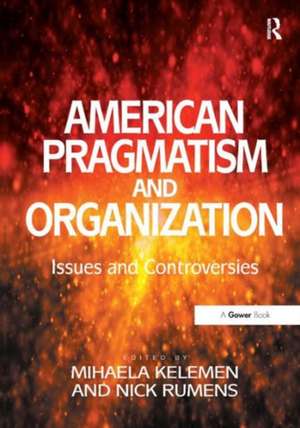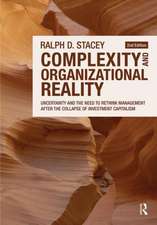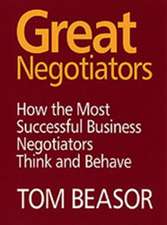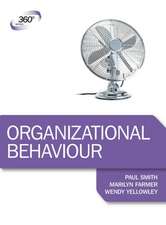American Pragmatism and Organization: Issues and Controversies
Autor Nick Rumens Editat de Mihaela Kelemenen Limba Engleză Hardback – 28 iun 2013
| Toate formatele și edițiile | Preț | Express |
|---|---|---|
| Paperback (1) | 324.16 lei 6-8 săpt. | |
| Taylor & Francis – 11 oct 2016 | 324.16 lei 6-8 săpt. | |
| Hardback (1) | 824.40 lei 6-8 săpt. | |
| Taylor & Francis – 28 iun 2013 | 824.40 lei 6-8 săpt. |
Preț: 824.40 lei
Preț vechi: 1105.41 lei
-25% Nou
Puncte Express: 1237
Preț estimativ în valută:
157.78€ • 164.28$ • 133.34£
157.78€ • 164.28$ • 133.34£
Carte tipărită la comandă
Livrare economică 10-24 martie
Preluare comenzi: 021 569.72.76
Specificații
ISBN-13: 9781409427865
ISBN-10: 1409427862
Pagini: 258
Ilustrații: Includes 4 b&w illustrations
Dimensiuni: 174 x 246 x 25 mm
Greutate: 0.7 kg
Ediția:New ed.
Editura: Taylor & Francis
Colecția Routledge
Locul publicării:Oxford, United Kingdom
ISBN-10: 1409427862
Pagini: 258
Ilustrații: Includes 4 b&w illustrations
Dimensiuni: 174 x 246 x 25 mm
Greutate: 0.7 kg
Ediția:New ed.
Editura: Taylor & Francis
Colecția Routledge
Locul publicării:Oxford, United Kingdom
Notă biografică
Dr Mihaela Kelemen is Professor of Management Studies at Keele University in the UK. Her current research, sponsored by three AHRC grants, is underpinned by an American pragmatist methodology, it aims to challenge the dualistic divide between academic knowledge and community practices. In particular, her research explores untold stories of volunteering and hidden community assets. Dr Nick Rumens is Reader in Management and Organization at the University of Bristol. His principal research interests include sexualities in organisation, workplace friendships and methodologies for doing critical management research. Published widely in a range of monographs, edited books and scholarly journals, Nick draws on a mix of American pragmatist and queer theories to inform his research. He is currently researching intersections between gay, lesbian, bisexual and trans sexualities, genders and ageing in the workplace. He has worked in senior human resource management roles in the National Health Service.
Recenzii
’A hallmark of pragmatism is its drive to transcend unproductive dualisms. Kelemen and Rumens, and their collaborators, have provided an important collection that contributes to the wide revival of pragmatist approaches now underway. They demonstrate that organizational research founded in pragmatist principles can overcome divisions between approaches stressing objective measurement and those emphasizing interpretation or construction, and can produce results that are both scientifically warranted and socially productive.’ Michael D. Cohen, School of Information, University of Michigan, US ’This fascinating book provides a refreshing and stimulating return to the analysis of pragmatism and neo-pragmatism in the social sciences. It assesses the work of key figures associated with the movement and expands this investigation to consider issues of current intellectual concern to scholars of economics, institutions and organisations. The various contributors offer perspectives that are at once original, critical and reflexive. Simply a must for anyone interested in the contemporary analysis of pragmatism.’ John Hassard, Manchester Business School, University of Manchester, UK ’It is a well-crafted work that provides a rich and skilful account of classic American pragmatist thought, its main concepts and issues. Further, it is useful as a heuristic device (there is nothing disparaging in that, on the contrary it is a pragmatist virtue) and is indeed an encouraging book to read.’ Scandinavian Journal of Management, vol. 30, no. 3
Cuprins
Part 1 Theory and Context; Chapter 1 American Pragmatism and Organization Studies: Concepts, Themes and Possibilities, Nick Rumens, Mihaela Kelemen; Chapter 2 Neo-Pragmatism and Phenomenology: A Proposal, Patrick Baert; Chapter 3 The Economic Crisis and the Crisis in Economics: Pragmatism and the Ontological Turn, Peter M. Jackson; Chapter 4 Pragmatism, Organizations and Getting to Grips with Reality, Tony J. Watson; Chapter 5 Eric Voegelin’s Reading of William James: Towards an Understanding of Leading within the Tensions of a Pluralistic Universe, Nathan Harter; Chapter 6 Pragmatism, Social Reconstruction, and Organizational Theory, David C. Jacobs; Chapter 7 American Pragmatism and Critical Management Studies, Ian Evans; Part 2 American Pragmatism Applied; Chapter 8 Pragmatism and Public Administration: Looking Back, Looking Forward, Patricia M. Shields, Travis A. Whetsell, Emily Kay Hanks; Chapter 9 Understanding Organizational Creativity: Insights from Pragmatism, Diane-Laure ArjaliÈs, Philippe Lorino, Barbara Simpson; Chapter 10 Organizational Learning: Knowing in Organizing, Ulrik Brandi, Bente Elkjaer; Chapter 11 Believing in a Pragmatist Business Ethic, Scott Taylor, Emma Bell; Chapter 12 The Practice of Government Finance, John R. Bartle, Patricia M. Shields; Chapter 13 A Pragmatist Approach to Emotional Intelligence and Managerial Regret, Rosa Slegers; Chapter 14 Developing Collaborative Power in Working Life: Linking American Pragmatism and Action Research, Tore Hafting, Erik Lindhult;
Descriere
Emerging during the late nineteenth century in the diverse scholarship of US commentators such as Charles Sanders Peirce, William James and John Dewey, American pragmatism shaped many intellectual currents within a range of disciplines including politics, education, administrative science and religion. However, American pragmatism struggled to maintain its influence and suffered a hiatus until it experienced a renaissance within scholarly circles during the 1970s. While renewed scholarly interest in American pragmatism continues to grow, it is only relatively recently that organization studies scholars have drawn upon American pragmatist philosophies for shedding new light on aspects of contemporary organizational life. American Pragmatism and Organization is a ground-breaking collection which draws together an international body of research focused on the interconnections and interplay between American pragmatism and organizational phenomena, explores the theoretical possibilities afforded by pragmatist thinking for understanding organization, and illuminates the practical advantages of doing so.














